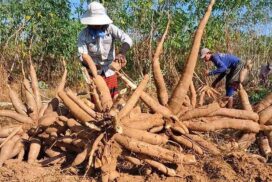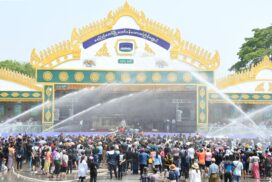By Maung Swe Ngae
If literature, like water, is high
Nation, like lotus, will be high.
If the literary standard is low
Nation will be at a low.
Almost everyone in the literary arena may be quite familiar with this four-line stanza. I have learned it by heart since the time when I put pen to paper.
Today, Sarsodaw Nay, or Literati Day, has come round once again. Whenever this day draws nearer, my random thoughts on literary activities usually come over to me. Sometimes, they sink into oblivion. But now, may I pen a few lines of my random thoughts on this significant day?
The lists of recipients of the National Lifetime Award for Literary Achievement for 2022, winners of the National Literary Award, and Sarpay Beikman Manuscript Award were announced on 18 November 2023. The award-presenting ceremony is (will be) held on 13 December 2023, which coincides with the 1st Waxing of Nadaw (Nattaw).
Of the twelve months, the month of Nadaw traditional customs, the month of Nadaw has been designated as the month of making obeisance to the literati. Likewise, the award presentation ceremony for the winners of the literary awards, including the recipients of the National Lifetime Award for Literary of Achievement, is held on this auspicious Sarsodaw Day. We do so and will do so. Why? Simply because this enables the people and the posterity to know the full essence of literature and value the role of literati.
Myanmar literature, fine arts and culture have been flourishing for years countable by the thousand. Throughout Myanmar’s history, thanks to the endeavours made by men of letters and those who have served the nation’s interests, the heritage of race, religion and national culture has been standing tall till today. In other words, literature is the main taproot that makes the branches of national culture and fine arts alive.
“History and culture are interdependent. They cannot exist and prosper isolated. Metaphorically speaking, there are two essential parts of a tree — history is the root, and culture is the fruit. Culture without history has no root, whereas history without culture bears no fruit. A nation is like a tree. If it has no history, it will never survive and grow; if it has no culture, it will never develop and progress. A nation with history and culture alone is a long-living and flourishing tree that can weather any storm and withstand any climate. Literature is one element of culture, and to study literature, historical background is necessary.”
Sayagyi Maha Saddhamma Jotikadhaja Sithu Dr Khin Maung Nyunt pointed out the important role of literature in the prologue of his book “An Outline History of Myanmar Literature”.
According to Sayagyi U Pe Maung Tin, a lifelong scholar of Myanmar literature, periods of literature have been divided into seven periods — Bagan, Pinya, Inwa, Taungoo, Nyaung Yan, Early Konbaung and Late Konbaung. Throughout the past periods, Myanmar classical literature composed of different kinds of poems and prose flourished in accordance with the prevailing political, economic and social situations of the periods.
From the time of King Anawrahta of Bagan up to that of the exile of King Thibaw of the late Konbaung period, one can vividly see the birth and growth of Myanmar literature through the ups and downs of Myanmar political life, the interaction of Myanmar’s history and literature and the strong influence of Theravada Buddhism on Myanmar literature. However, the development of Myanmar Literature was retarded and neglected under the yoke of British imperialists.
During the period when Myanmar remained in eclipse, literary works that dealt with political awareness emerged from patriotic writers’ hearts. Such works served as guiding lights during the time of anti-colonialism and national liberation struggles. Literary works agitating for national liberation, both in verse and song, appeared without interruption among the national people.
To put it in a nutshell, the participation of literary men in the political movements — GCBA activities, the 1920 Students Boycott opposing the colonial education system, Peasants Revolution in 1930, publications of Nagani Book Club (1937), 1300 ME Revolution sparked by Chauk Oilfield Strike (၁၃၀၀ ပြည့် ရေနံမြေ အရေးတော်ပုံ) — for upholding patriotism were not only significant but effective too. Again, in the Fascist Japanese occupation, literary men participated in the anti-fascist campaigns, using their pens as weapons. They unitedly showed the strength of their mightier pens.
It is for this reason that in recognition of the noble activities of the literary men, including literati and (literary) scholars, they are honoured by the State.
In the times of Myanmar’s kings, the nation had the tradition of honouring outstanding literati, princes, and court officials with little. In the month of Nadaw, the king held a special audience at the palace and honoured those who had literary accomplishments. In this regard, we can read a brief history of Sarsodaw Nay, or ‘Literati Day’ (formerly used as ‘Writers Day’ and ‘Men of Letters Day’ and so on) complied by Malikha in ‘Myanmar Sarpay Abhidan (II)’.
During the Japanese occupation, while the compilation of dictionaries and encyclopaedia was being carried out in Kungyangon, a programme to celebrate the memorial day of U Ponnya was adopted. The Pyinnya Dagun Association was informed to do so. Then, men of letters, those from the Pyinnya Dagun Association and the Writers Association, held a meeting on 8 May 1944 to observe the Sarsodaw Nay instead of observing a memorial day that would represent only a man of letters. The meeting decided that ‘Bama Sarsodaw Nay’ (ဗမာ့စာဆိုတော်နေ့) should be celebrated on the 1st Waxing of Nadaw of Myanmar Era (ME) every year instead of holding ‘U Ponnya Memorial Day’.
In accordance with the decision, the first Sarsodaw Nay was observed on 15 November 1944 (1st Waxing of Nadaw 1306 ME). Myanmar Writers Association staged ‘Wizaya Play’ (ဝိဇယပြဇာတ်) in Yangon. In commemoration of ‘Sarsadaw Nay, ‘ literary talks, debates, literary competitions, and discussions were held in many parts of the nation.
From that year onwards, Sarsodaw Nay’ is celebrated on the 1st Waxing of Nadaw every year. The Myanmar Writers Association mostly conducts the ceremony of Sarsodaw Nay. On this significant day, aged veteran writers and literary scholars are paid obeisance and literary talks are staged in honour of men of letters.
The first Sarsodaw Nay was observed at ‘Myaing Theatre’ near Kandawgyi Lake in Yangon. At the ceremony, Literary enthusiasts, men and women of letters, and even education department teachers honoured and praised the virtues of aged Literati.
Today, the government holds a grand ceremony to present literary awards, including National Lifetime Awards for Literary Achievement, National Literary Awards, and Sarpay Beikman Manuscript Awards (for 2022) to the recipients and winners on this significant day of the literary world.
The lofty aims of holding the ceremony are to praise the literary virtues of professionals who have served the interests of the nation and the people with the might of pen, to enable the entire people to know and value the precious role of the literary and their works, and for the people to always keep the value and benefits of Myanmar literature in their mind.
Literati are honoured on the Sarsodaw Nay as they have developed and handed over literature to new generations by inheriting and preserving it.
Literature is the soul of a nation. A country’s ups and downs solely depend on that nation’s literary standard. No one can deny that.
Like world literature, Myanmar literature is a repository of progressive ideas and thoughts. To cherish and safeguard it is the unavoidable duty to be carried out by all and sundry of the literary world.
As long as the ceremony of Sarsodaw Nay and the literary awards presentation ceremony are maintained and promoted, we will gain many benefits from literature.
Adorable Myanmar literary heritage should be preserved.
Reference :
– An Outline History of Myanmar Literature by Dr Khin Maung Nyunt, Revised Edition (2023)
– The New Light of Myanmar, 4 December 2013















